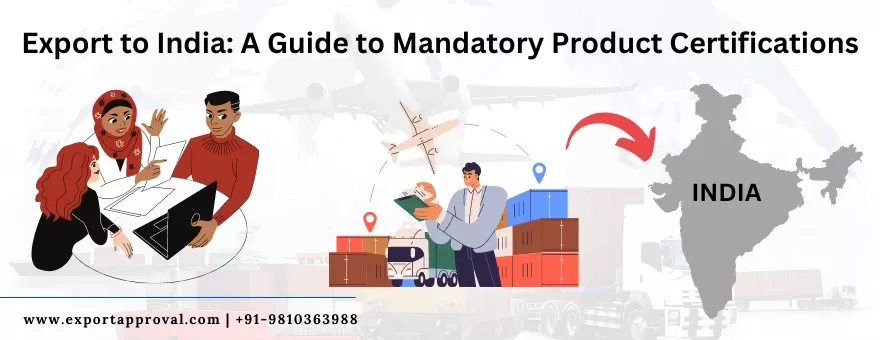A Comprehensive Guide for Exporting Products to India

India, with its rapidly growing market, presents a lucrative opportunity for manufacturers looking to expand their horizons.
However, navigating the regulatory landscape, particularly when it comes to product certifications and approvals, is crucial for a successful entry into the Indian market.
In this blog, we will discuss the essential certifications and approvals that exporters must know before exporting their products to India.
Let’s explore!
Role of Product Certifications and Approvals in India
Before delving into specific certifications, it's essential to understand the significant role that product certifications and approvals play in the Indian market.
In India, product certifications are important in safeguarding consumer interests and guaranteeing the overall quality of imported goods.
The Indian government mandates certain standards and regulations to ensure the safety and reliability of specific imported products.
Compliance with these standards facilitates smoother entry into the market and builds trust among consumers and regulatory bodies.
Types of Indian Certifications and Approvals
There are various types of mandatory certifications that are required to export products to India. Some of the major certifications include:
1. BIS CRS Registration
The Bureau of Indian Standards (BIS) plays a pivotal role in ensuring the quality and safety of products entering the Indian market.
CRS (Compulsory Registration Scheme) is a scheme of BIS, mandatory for various electronic and IT goods.
This registration scheme is aimed at ensuring that products meet the necessary safety standards and are in compliance with Indian regulations.
To obtain BIS CRS Registration, exporters need to submit the required documents, including product test reports from BIS-recognized laboratories.
The registration process involves thorough evaluation and testing to verify that the product conforms to the specified standards.
Once obtained, BIS CRS Registration is a testament to the product's quality and compliance with Indian regulations.
Importance of BIS CRS Registration
- It ensures adherence to Indian regulations, avoiding legal complications.
- It instills trust by assuring consumers of product safety and quality.
- It opens doors to the vast Indian consumer market.
2. BIS ISI Certification
Another crucial certification from the Bureau of Indian Standards is the ISI (Indian Standards Institution) Certification.
This certification is applicable to various products, including electrical appliances, automotive components, and building materials.
BIS ISI Certification is a mark of quality and safety, assuring Indian consumers that the product adheres to the relevant Indian standards.
To obtain BIS ISI Certification, exporters must undergo rigorous testing of their products in BIS-approved laboratories.
The certification process involves both factory inspections and product testing to ensure compliance with Indian standards.
Once obtained, the ISI mark will be issued for your products, highlighting compliance with Indian regulations.
Importance of BIS ISI Certification
- It is a legal requirement for selling products in India, ensuring adherence to national standards.
- It signifies compliance with stringent quality standards set by BIS.
- It enhances marketability by providing a competitive advantage.
3. WPC ETA Approval
The Wireless Planning and Coordination (WPC) is the national authority responsible for managing the radio frequency spectrum in India.
Exporters of several wireless and communication equipment must obtain WPC ETA (Equipment Type Approval) before introducing their products to the Indian market.
ETA, a type of WPC Approval, is crucial to ensure that the wireless devices do not interfere with existing communication networks and comply with relevant technical specifications.
The WPC ETA Approval process involves the submission of technical documents, test reports, and compliance certificates.
Once approved, the product can legally operate on the specified frequency bands in India.
Importance of WPC ETA Approval
- It is essential to comply with WPC regulations to avoid legal complications.
- It grants access to the required radio frequency spectrum for wireless communication.
- It ensures the product operates without causing interference to other wireless devices.
4. TEC Certification
Telecommunication Engineering Centre (TEC) Certification is mandatory for telecommunications equipment imported or manufactured in India.
TEC ensures that certain telecom products meet the necessary technical and quality standards, promoting interoperability and reliability in the Indian telecom network.
Exporters seeking TEC Certification must submit technical documents, test reports, and other required information to demonstrate compliance with TEC's specifications.
The certification process includes product testing in TEC-approved laboratories.
Obtaining TEC Certification is crucial for the seamless integration of telecom equipment into the Indian network, facilitating smooth communication services.
Importance of TEC Certification
- It confirms the legal compliance in the Indian telecom sector, avoiding regulatory issues.
- It ensures compatibility with Indian telecommunication networks.
- It acts as a prerequisite for entering the Indian telecom market, unlocking business opportunities.
Conclusion
Exporting products to India requires a thorough understanding of the mandatory certifications and approvals.
Export Approval, a reliable platform powered by Brand Liaison, is committed to assisting manufacturers seeking BIS CRS Registration, BIS ISI Certification, WPC ETA Approval, and TEC Certification to export their products to India.
Manufacturers can confidently entrust their export ambitions to the expertise of our team, knowing that their journey into the Indian market is backed by a team dedicated to ensuring compliance and success.
With a proven track record of facilitating seamless approvals, our team of experts expedites the certification process to provide quick and hassle-free certifications.

